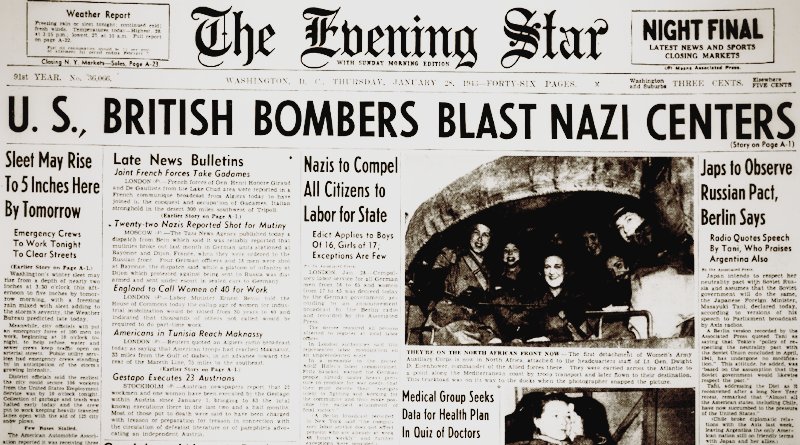World War II Chronicle: January 28, 1943
Click here for TODAY’S NEWSPAPER
Page five tells the story of a Samoan chief offering Marine corporal and retired boxing champion Barney Ross his daughter in marriage after Ross defeated a native boxer… George Fielding Eliot column on page 14… Sports on page 23
Roving Reporter by Ernie Pyle
A FORWARD AIRDROME IN FRENCH NORTH AFRICA — Nine American boys have just had a unique baptism of war.
They left America very recently on a bomber, bound for the African front. They arrived here a little later, by camelback, including a battle with German fighter planes. Here is the story:
A Flying Fortress, commanded by Lt. Harry Dever of Martinsburg, W. Va., took off from America during the holidays and flew without incident across the Atlantic and to the coast of Africa. Dever’s crew of eight was composed of Lt. Richard Banning of Britt, La., co-pilot; Lt. Charles Watt, Jacobsburg, O., navigator; Lt. Victor Coveno, Cleveland, and five sergeant-gunners — W. K. Thames, Fayatteville, N.C.; Joseph Obradovich, Lacrosse, Wis.; Richard Hasbrough, Brooklyn; Harry Alsaker, Montana, and Robert Oheron, Cresline, O.
After landing in Africa they took off one recent morning and formed up with two other Fortresses for the last lap of their journey to war. They headed for the designated airdrome at the front where they were to report for action.
They flew all day, and when they arrived where they thought the field should be they couldn’t find it. So they flew on and kept hunting. The afternoon wore on and dusk grew near.
Suddenly, out of a blank sky, two fighters dived on them. Bullets began to spatter. That was how these youngsters fresh from America discovered that they had wandered into enemy territory. What a fine way to start their war!
Devers’ crew began shooting back, but the fighters switched to one of the other Forts, which soon circled downward and disappeared, apparently shot down. It has not been heard from since.
The two remaining planes lost the Germans in the dusk. One made a crash landing. Devers’ circled over it and was given a signal not to land. Several days later American reconnaissance planes discovered this Fortress being towed along the road, headed for Italian territory. They dived at it, guns going and set it afire.
That accounts for two of the Forts and gets us down to our friends mentioned above.
They were alone in the air now and they headed back west to get away from the enemy. It was dark, and they still couldn’t find the airdrome to which they were being sent, so they flew far south to make sure of getting away from the mountains. They went up to 11,000 feet, flew until their gas was gone, and then jumped.
Devers gave them all instructions before they jumped. They were flying south and he would be the last man out, so he would start walking north and all the others south. The plan worked. Eight of the nine found each other within half an hour. Lieutenant Coveno landed in a gully half a mile away and spent the night there, rejoining the others in the morning.
That first night they all slept on the ground, wrapped in their parachutes. They didn’t know whether they were in enemy territory or not.
At dawn an old Arab came wandering past. He was a nomadic shepherd, and he spoke neither English nor French. But he was wonderful to these boys. He led them northward, and they walked all day, covering 20 miles. Again that night they slept in their chutes, and they almost froze.
The second morning they came across a caravan of 15 camels. In charge of them was an Arabian enlisted man in the French army. He was touring the desert buying camels for the French.
This Arab took the boys along with him. They learned later that the thought they were Italian parachutists and thought he was capturing them.
They rode camels for two days — and they never want to see another camel. They had to ride bareback, and they say a camel’s back would make an excellent razor blade.
They would ride till they couldn’t bear it any longer, and then get off and walk. But the sand was so deep they couldn’t walk either, so they’d have to get back on their desert chariots.
For two days and nights they traveled by camelback across the bare sands. There were no trails, no roads. On the morning of the fourth day they came upon a French desert garrison and here they were able to identify themselves for the first time, as Dever speaks some French.
The French officers put them to bed and arranged for a truck to take them to a meeting place with an American truck.
So, finally, at the end of the fifth day, they arrived at the airdrome they had hunted for so desperately five nights before.
They were tired, but not in bad shape. They were still animated, and willingly told the story over and over to Army officers.
We finally had to make them go to bed, at 10 o’clock.
A good sleep was too much for them. The next morning they felt washed out and weary. Some of them were even sick at the stomach. But in a day or two they will be normal again, when their excitement over being alive quiets down a bit.
Evening star. (Washington, D.C.), 28 January 1943. Chronicling America: Historic American Newspapers. Lib. of Congress.
https://chroniclingamerica.loc.gov/lccn/sn83045462/1943-01-28/ed-1/
